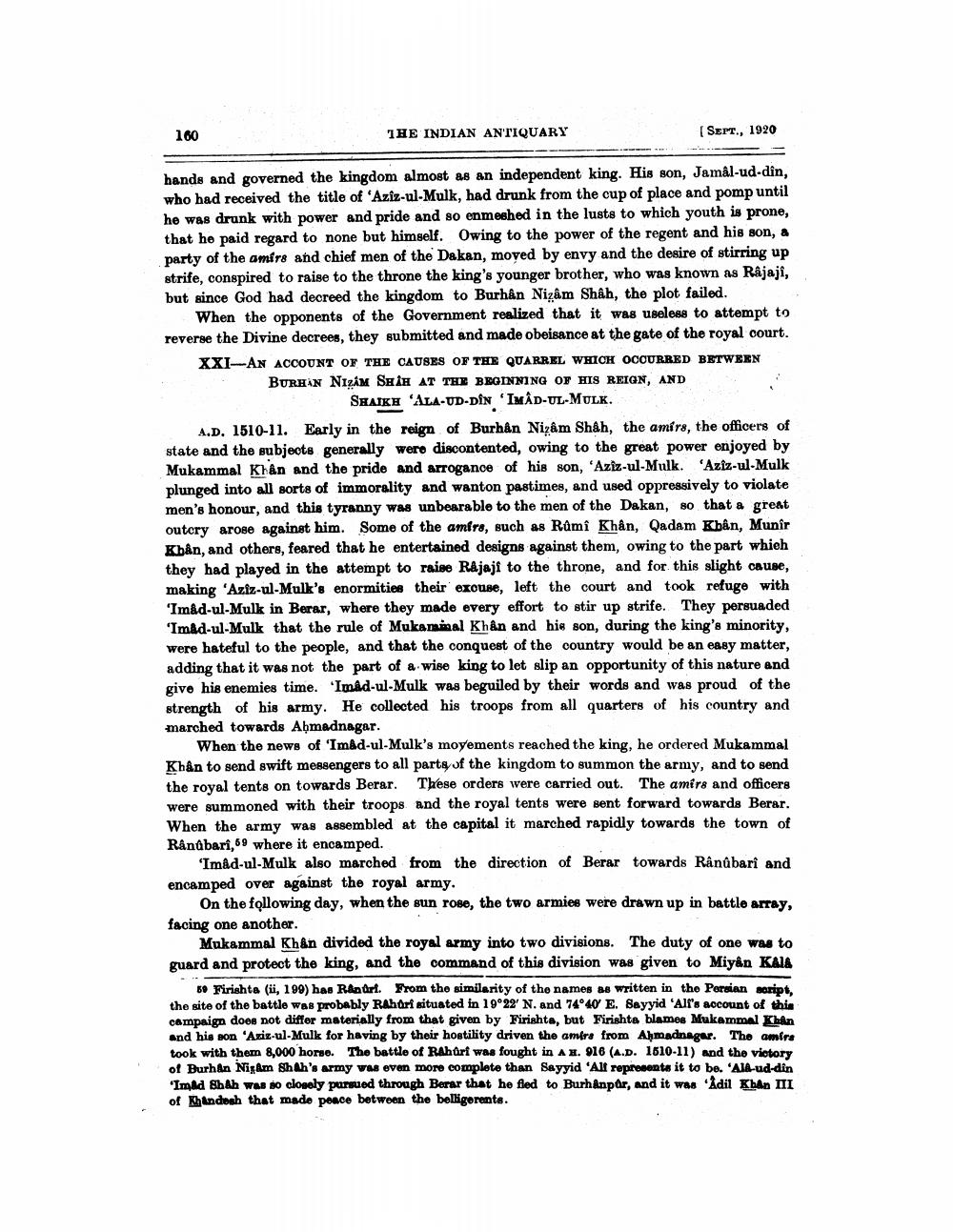________________
160
THE INDIAN ANTIQUARY
(SEPT., 1920
hands and governed the kingdom almost as an independent king. His son, Jamal-ud-din, who had received the title of 'Aziz-ul-Mulk, had drunk from the cup of place and pomp until he was drunk with power and pride and so enmeshed in the lusts to which youth is prone, that he paid regard to none but himself. Owing to the power of the regent and his son, a party of the amirs and chief men of the Dakan, moyed by envy and the desire of stirring up strife, conspired to raise to the throne the king's younger brother, who was known as Rajaji, but since God had decreed the kingdom to Burhan Nizam Shah, the plot failed.
When the opponents of the Government realized that it was useless to attempt to reverse the Divine decrees, they submitted and made obeisance at the gate of the royal court. XXI-AN ACCOUNT OF THE CAUSES OF THE QUARREL WHICH OCCURRED BETWEEN BURHAN Nizim SHIH AT THE BEGINNING OF HIS REIGN, AND
SHAIKH ALA-UD-DIN "IMAD-UL-MULK. A.D. 1510-11. Early in the reign of Burhan Nizam Shah, the amirs, the officers of state and the subjeots generally were discontented, owing to the great power enjoyed by Mukammal Khan and the pride and arrogance of his son, 'Aziz-ul-Mulk. 'Aziz-ul-Mulk plunged into all sorts of immorality and wanton pastimes, and used oppressively to violate men's honour, and this tyranny was unbearable to the men of the Dakan, so that a great outcry arose against him. Some of the amfrs, such as Rûmî Khân, Qadam Khân, Munir Khân, and others, feared that he entertained designs against them, owing to the part which they had played in the attempt to raise R&jaji to the throne, and for this slight cause, making 'Aziz-ul-Mulk's enormities their excuse, left the court and took refuge with 'Imád-ul-Mulk in Berar, where they made every effort to stir up strife. They persuaded 'Imad-ul-Mulk that the rule of Mukammal Khan and hie son, during the king's minority, were hateful to the people, and that the conquest of the country would be an easy matter, adding that it was not the part of a wise king to let slip an opportunity of this nature and give his enemies time. 'Imâd-ul-Mulk was beguiled by their words and was proud of the strength of his army. He collected his troops from all quarters of his country and marched towards Ahmadnagar.
When the news of 'Imád-ul-Mulk's moyements reached the king, he ordered Mukammal Khân to send swift messengers to all party of the kingdom to summon the army, and to send the royal tents on towards Berar. These orders were carried out. The amirs and officers were summoned with their troops and the royal tents were sent forward towards Berar. When the army was assembled at the capital it marched rapidly towards the town of Ranubari,69 where it encamped.
'Imád-ulMulk also marched from the direction of Berar towards Rânübari and encamped over against the royal army.
On the following day, when the sun rose, the two armies were drawn up in battlo array, facing one another.
Mukammal Khan divided the royal army into two divisions. The duty of one was to guard and protect the king, and the command of this division was given to Miyên KAIA
* Firishta (ü, 199) has Renart. From the similarity of the names as written in the Persian soript. the site of the battle was probably Rahar situated in 19° 22' N. and 74 40 E. Bayyid 'All's account of this campaign does not differ materially from that given by Firishta, but Firishta blamee Mukammal Khan and his non 'Aziz-ul-Mulk for having by their hostility driven the améra from Ahmadnager. The amira took with them 8,000 horse. The battle of RAhorf was fought in A . 916 (A.D. 1610-11) and the victory of Burhan Nigam Shah's army was even more complete than Sayyid 'All represents it to be. 'All-ud-din 'Imad Sh Ah was so closely pursued through Berar that he fled to Burhanpor, and it was dil Khan III of Khandesh that made peace between the belligerente.




